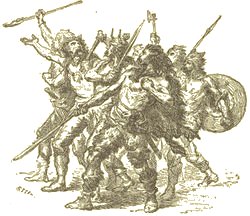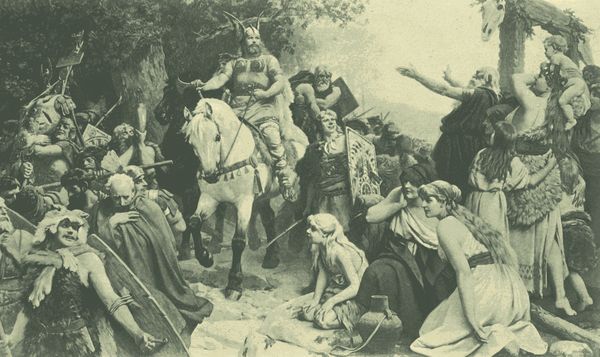 Hermann, also known as Arminius, was a chieftain of the Germanic Cherusci tribe who played a pivotal role in one of ancient history's most significant battles against the Roman Empire. Born in 17 or 18 B.C., Arminius was initially an ally of Rome. He was trained as a Roman military commander and even served in the Roman army, gaining valuable insights into Roman military tactics and strategies.
Hermann, also known as Arminius, was a chieftain of the Germanic Cherusci tribe who played a pivotal role in one of ancient history's most significant battles against the Roman Empire. Born in 17 or 18 B.C., Arminius was initially an ally of Rome. He was trained as a Roman military commander and even served in the Roman army, gaining valuable insights into Roman military tactics and strategies.
Arminius's legacy is primarily defined by the Battle of the Teutoburg Forest in A.D. 9. During this battle, he orchestrated a masterful ambush against three Roman legions led by Publius Quinctilius Varus. The Romans were marching through the dense Teutoburg Forest in present-day Germany when Arminius, leveraging his knowledge of Roman tactics and the terrain, launched a surprise attack. The ensuing battle resulted in a catastrophic defeat for Rome, with nearly 20,000 Roman soldiers killed. This victory halted Roman expansion into Germanic territories and marked a turning point in the Roman-Germanic conflicts.
 Arminius's success was not only a military triumph but also a symbol of Germanic resistance against Roman imperialism. He united various Germanic tribes, demonstrating that cooperation could repel even the most formidable adversary. His actions preserved the independence of the Germanic tribes and inspired future generations.
Arminius's success was not only a military triumph but also a symbol of Germanic resistance against Roman imperialism. He united various Germanic tribes, demonstrating that cooperation could repel even the most formidable adversary. His actions preserved the independence of the Germanic tribes and inspired future generations.
Despite his success against Rome, Arminius's later life was fraught with internal strife. He struggled to maintain unity among the Germanic tribes and faced opposition from rival chieftains. In A.D. 21, Arminius was assassinated by members of his own tribe who feared his growing power.
Arminius remains a significant figure in German history and folklore, celebrated as a national hero who defended Germanic freedom and sovereignty. His legacy endures as a testament to the impact of leadership, strategy, and the fight for independence.
|
 Hermann, also known as Arminius, was a chieftain of the Germanic Cherusci tribe who played a pivotal role in one of ancient history's most significant battles against the Roman Empire. Born in 17 or 18 B.C., Arminius was initially an ally of Rome. He was trained as a Roman military commander and even served in the Roman army, gaining valuable insights into Roman military tactics and strategies.
Hermann, also known as Arminius, was a chieftain of the Germanic Cherusci tribe who played a pivotal role in one of ancient history's most significant battles against the Roman Empire. Born in 17 or 18 B.C., Arminius was initially an ally of Rome. He was trained as a Roman military commander and even served in the Roman army, gaining valuable insights into Roman military tactics and strategies.
 Arminius's success was not only a military triumph but also a symbol of Germanic resistance against Roman imperialism. He united various Germanic tribes, demonstrating that cooperation could repel even the most formidable adversary. His actions preserved the independence of the Germanic tribes and inspired future generations.
Arminius's success was not only a military triumph but also a symbol of Germanic resistance against Roman imperialism. He united various Germanic tribes, demonstrating that cooperation could repel even the most formidable adversary. His actions preserved the independence of the Germanic tribes and inspired future generations.







